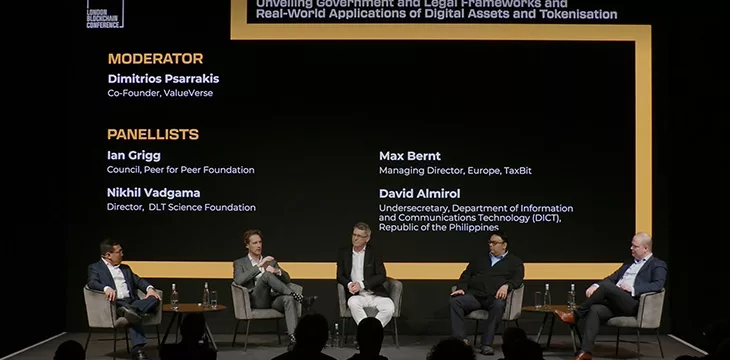|
Getting your Trinity Audio player ready...
|
Tokenization is set to transform the digital economy in the coming years, provided global governments and regulators are willing to adapt to this revolution.
At the London Blockchain Conference 2024, Dimitrios Psarrakis, co-founder of the ValueVerse digital finance strategy group, assembled a stellar group of panelists for a discussion labeled Navigating the Digital Horizon – Unveiling Government and Legal Frameworks and Real-World Applications of Digital Assets and Tokenization.
The four experts offering their views were an impressive crew: financial cryptographer Ian Grigg of the Peer For Peer Foundation; Nikhil Vadgama, director at the DLT Science Foundation; David Almirol, Undersecretary, Dept. of Information and Communications Technology (DICT), Philippines; and Max Bernt, Managing Director, Europe of compliance/reporting solution TaxBit.

Pasarrakis got the ball rolling by recounting his involvement in the space since 2016 and his search for ways to make the financial system smarter. He helped create the European Parliament’s blockchain resolution and said the top questions he received were about where the value of tokenization comes from, what the economic benefits/risks are, and how any of this might actually change business models.
Vadgama said the “academic” answer is that tokenization offers “the removal of intermediaries, a direct connection, the use of smart contracts and immutability. These are all the same pieces of value the technology has that you’re bringing through tokenization of whatever you wish to tokenize.”
Vadgama said, “The greatest penetration of tokenization to date is within the legacy financial sector,” calling the USDT (Tether) and USDC (Circle) stablecoins “the first examples of tokenization and the largest use cases.” The primary benefit of stablecoins is their ability to “seamlessly transfer value,” particularly when you compare them to the traditional financial services environment and its “incredible number of frictions.”
Asked whether the sole benefit of tokenization was the removal of long-term aggregate costs, Grigg offered an alternate example, citing a company he ran in the early 2000s that found itself in trouble due to significant debts to staff and suppliers. Grigg decided to “tokenize an internal money” based on USD “with a contract that was empty of value.” Grigg then “took that money and bought back my debts from all my people—salaries, utilities, et cetera—with my empty digital cash.”
To Grigg’s surprise, “everyone preferred to hold my empty digital cash” rather than be his fiat creditors. “The reason was simple accounting. I’d replaced all their understandings of what I owed them with my digital cash, which simplified the whole thing.” Grigg said his model ultimately proved “so popular that I had to double and then double again the amount of ‘cash’ I issued simply so that all my creditors could manage their accounting position.”

Grigg said his system succeeded because there is “value in accounting properly for things including debts and trade finance. Get rid of your accounting system; just issue cash and move it back and forth within the company, including to your employees.”
Grigg said he would even pay his electric bill by posting digital cash on an internal company noteboard; then somebody would buy that electricity bill, go pay it and take a fee. “So I was paying my electricity bill with my own cash—that I didn’t have. That’s value, that’s accounting relaxation, making everybody happy,” he said.
Bureaucratic quicksand
Pasarrakis referenced the recent statements by Blackrock CEO Larry Fink that tokenization would be “the next generation for markets.” Pasarrakis noted that such sentiments weren’t all that new, citing Sweden’s 2017-18 experiments with tokenizing real estate that “ultimately ended up nowhere.” Pasarrakis claimed that “many critical aspects” need to be considered, including the lack of intermediaries and counter-party risks.
Almirol noted that his department was formed seven years ago, a period in which the Philippines was “a newcomer” to all things blockchain. However, this latecomer status allowed it to leverage the work of other nations to implement the tokenization of the country’s first national identity system. This became part of the Philippines’ eGov Super App, which has garnered close to one million downloads since its launch a year ago.
Almirol said it’s important for the government to support this initiative “whether they like it or not.” Once everyone “understands the beauty of the use case, the simplicity, the accountability, the transparency, the creation of trust … our national ID can power up passport applications, drivers’ licenses, permits, payment of taxes” and more.

Almirol admits that governments aren’t optimized for quick decision-making. In his pre-government life, Almirol founded “the biggest software company in the Philippines” and he found the government’s fondness for repetition “toxic, too complicated, really hard to process. The private sector is suffering because government isn’t embracing emerging tech like AI, blockchain, etc.”
Pasarrakis added that governments often fail to grasp the transparency that blockchain could offer in areas like digital identity for compliance, taxation, and anti-money laundering (AML). The Bank for International Settlements (BIS) calls this “embedded supervision—on-chain compliance where you have a digital identity that offers proof that you’ve already fulfilled the requirements with applicable AML/tax regimes.”
Almirol cautioned that governments should start small and build confidence before cannonballing into the tokenization deep end. “Maybe start with a simple transaction layer like national ID, compliance, data privacy, cybersecurity. Create the mindset that people will accept, make sure it can be implemented, and then everyone will follow.”
Tossing out the old playbook
TaxBit’s Bernt echoed Almirol’s advice that “you need to show [governments] how they can benefit.” Bernt said he saw “big regional differences in the European approach to tokenization,” but the global trend is toward creating the legal foundations “because governments are starting to realize the value of it.”

In 2018, Germany implemented laws to tokenize shares; Bernt called it “a huge pain then, an easy process now.” Bernt said much of the resistance to tokenization came from “how ownership is transferred, on the private law side. Since tokens are borderless by design, it’s very difficult to put them into existing boxes.”
Pasarrakis asked Grigg whether governments and regulators ‘get’ what’s going on. Grigg noted that the European Union wrote its first report on prepaid card cash in 1994, so when Bitcoin came along, it had 20 years of experience. But “they forgot it all and started again.”
Grigg offered two examples of regulators ignoring the tools already in their toolbox, starting with “the humble contract. If regulators were to turn around and say to everybody in this space ‘show us your contract,’ they would solve a lot of issues, because most of the space is unclear, undefined, everybody’s talking but nobody’s writing down the deal.”
“If the contract was clearly present, the regulator can say ‘okay, there’s your contract, now stick to it’ and you would then evolve the space into a much healthier place. The regulator is saying, ‘Let’s create some rules, this, that, and the other,’ none of which really works. What does work is the humble contract, that’s how we deal with society.”
The second example involved placing real-world assets “in a trust, a 1,000-year-old mechanism literally for storing assets on behalf of beneficiaries. So you already have the tools there to do real world asset [tokenization], put them out there as a contract, put the assets into a trust, and then you line up all the legal threads to match.”
Bottle fed
Vadgama cited the annoying tendency of government departments/agencies to work in silos and move at different paces. “This is stifling progress” by the private operators who often find their innovations dying on the vine while waiting for these various branches to coordinate their efforts.
Vadgama offered his own frustrating experience, citing a period around 2018-19 when he wrote a white paper on real estate tokenization for the U.K. government’s land registry office. Real estate transactions typically take 6-12 weeks or longer, “but with tokenization, this could be boiled down to minutes in terms of the legal settlement aspect. What have we seen as progress since then? Very little, or even nothing.”

As for what the future holds, Vadgama said that while stablecoins/money market funds/bonds/CBDCs “are all great and fabulous, what about real estate, IP, tokenization of water? You can tokenize everything if there is a market to be made there. I see new kinds of mechanisms, borrowing from the DeFi world, taking [automated market maker] models and utilizing them for the provision of liquidity.”
Grigg observed that one problem with tokenizing ‘everything’ is that until legal certainty is created, “the token itself is not as valuable as it could be, not as attractive. Users know they’re playing with fire, that stuff could disappear.”
Grigg added that “we’ve gone through ICO phase, NFT phase, DeFi phase, AI phase … nobody’s creating certainty, so consumers are looking at it as just another shell game. ‘Will I have the rug pulled out from under me? Probably, let’s play.’ Until we get past that and start being serious, we won’t see a tokenized world.”
Bernt agreed that legal certainty is necessary if tokenization is to become more than “a buzzword to attract investors.” For example, there’s a flood of tokenization projects around IP rights, “but barely anyone understands that having a token doesn’t mean I own the IP rights if it’s not registered within the public books.”
Almirol got the final word, noting that the conference attendees “know the whats and the whys” on tokenization’s technical front “but the ‘how’ part is the critical issue here. Tokenization may be too broad, too big to discuss. We need more laser focus on specific areas. Solve particular issues and problems and it will grow dramatically. Start with the most implementable/doable ones. We’re like a child—we need to feed milk first, and it will grow.”
Watch: Calvin Ayre is all in on Metanet—the game-changing fusion of enterprise blockchain, AI & IPv6

 09-15-2025
09-15-2025 





